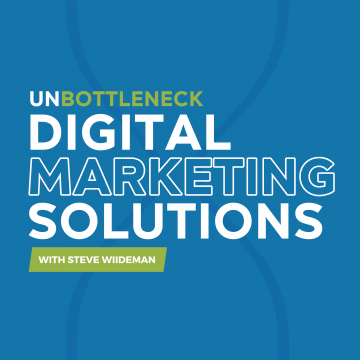Podcast: Play in new window | Download
In this episode of the Unbottleneck Podcast, Steve Wiideman is joined by B2B marketing influencer and digital engagement security specialist Kathleen Booth to discuss selling trust, scam websites, and team security training.
About Our Guest: Kathleen Booth
Kathleen Booth is the CMO at clean.io, the market leader in digital engagement security solutions used by businesses looking to optimize their revenue and buyer experience by taking back control over third-party code on their websites.
Prior to joining clean.io, she spent 13 years in the digital marketing agency world, first as Owner and CEO of Quintain Marketing and then as VP of Marketing at IMPACT. Kathleen is the host of the long-running Inbound Success Podcast and was named by TopRank as one of the 50 Top B2B Marketing Influencers of 2019 and 2021.
Sponsored by Ryte
Featured in this episode:
- Selling Trust: Digital Engagement Security
- The Truth About Web Browser Extensions
- Understanding Malvertising
- Playing Defense with Cybersecurity
Selling Trust: Digital Engagement Security
There are so many businesses that sell various products and services across different industries, but businesses all sell the same thing: trust. Before the digital age, trust was established through human interaction when a customer walked into a storefront. As technology has evolved, we’ve moved to an online model so now websites serve as a business storefront.
Businesses now have a responsibility to establish trust from a more technical perspective by optimizing their website for user experience. This includes making digital engagement security a priority.
Digital engagement security is creating a safe and secure environment in order to have trustworthy digital engagements with your audience including users, visitors, prospects, and customers.
We now live in a time where the majority of business is conducted online so, therefore, privacy and security are paramount. This includes having a valid SSL certificate, frequently updating plug-ins, and having a secure checkout for customers to make purchases.
Who’s in Control? The Truth About Web Browser Extensions
If you work in any area of marketing, there is a great chance that you consistently use web browser extensions such as Moz ToolBar and Grammarly. Extensions are great because they provide a shortcut for users to take advantage of tools on different websites without having to switch between tabs.
While this provides a more convenient way of surfing the web, this creates a problem for website owners because these extensions are running a third-party code on your website that you have no control over. So therefore, if you are allowing a third-party code to run on your website, you don’t truly have control over what’s happening and it can impact the user experience, thus impacting your brand reputation and revenue.
This type of vulnerability can be seen through the eCommerce business with coupon extensions such as Honey. When customers use a special coupon code at checkout (thank you, VIP, insider exclusive, etc.), that code is then shared with everyone who uses that extension. This creates a problem for eCommerce businesses because these “exclusive” coupons are being used by people whom they were not intended for. When coupons become fair use, they can impact a company’s profit margin.
Understanding Malvertising
Malvertising is something that everyone has encountered at one time or another. We’ve all been there where we click on something and then all of a sudden a popup appears that redirects us to a scam website that is trying to get your information. This is known as malvertising, or malicious ads.
This can really hurt a website because if visitors encounter this type of ad, they may not come back to your website.
Playing Defense with Cybersecurity
As a marketer, you have to care about cybersecurity as much as you care about driving traffic to your website. All digital marketers should go through some level of cybersecurity training at least once a year because technology is always evolving and we want to ensure we are being proactive in our security measures.
If you are a business owner it is imperative that you invest in cybersecurity training for your employees to ensure that they not only protect the business but also themselves from cyberattacks.
Keep up with the latest in cybersecurity and digital marketing strategies. Follow Steve on LinkedIn!




